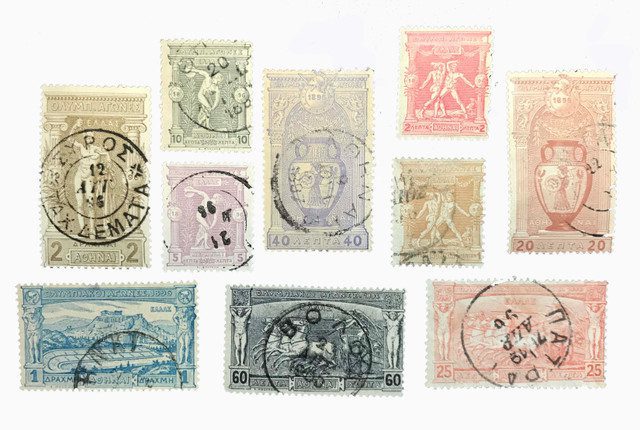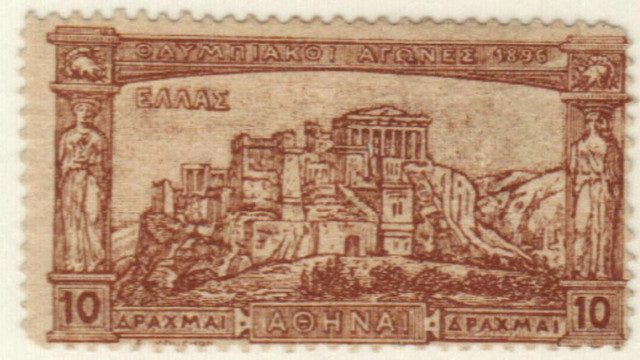
The first Olympic Games in 1,500 years began on April 6, 1896, in Athens, Greece.
According to legend, Hercules founded the Olympic Games to honor his father Zeus. The earliest games began in 776 B.C. States were prouder of Olympic victories than of battles they won. Women, slaves, and foreigners weren’t allowed to participate. The first Olympic events were running contests. Boxing, chariot racing, and wrestling contests were added over time. Roman Emperor Theodosius I ended the games in 393 A.D. because he feared they had a pagan influence.
Centuries later, the French attempted to revive the games, holding L’Olympiade de la Republique (The Olympics of the Republic) between 1796 and 1798. Though that attempt failed to bring back the Olympics, France did play a key role in the Olympic revival.
A few decades later, young aristocrat Pierre de Coubertin lived in a German-occupied area of France. Coubertin thought France was defeated by a “lack of vigor” rather than inferior military skills. He studied the education of German, British, and American children and concluded exercise and sports made people well rounded and vigorous.
By 1890, Coubertin had established a sports organization. And four years later he founded the first International Olympic Committee (IOC) and worked to revive the Olympic Games to promote peace and stability.
The Olympics Games opened in Athens on April 6, 1896. While there weren’t any national Olympic Committees to choose and sponsor athletes, Coubertin knew many European and American sportsmen. He convinced them to form national teams. Approximately 300 athletes representing 14 countries competed in 43 events. (In contrast, the 2012 Olympics featured over 10,000 athletes from more than 200 countries competing in 302 events.)
By April 10, the hosting Greeks had yet to win a track and field event. Their hopes lay in the upcoming marathon, a race invented for these Olympics. Thousands of years earlier, a largely outnumbered Greek force managed to defeat a superior Persian army. Legends say, following the victory, a Greek soldier named Pheidippides ran from that bloody plain of Marathon all the way to Athens, and proclaimed, “We were victorious!” as he died. The Battle of Marathon is considered one of the most important battles in the history of the world.
When the Olympic Games were revived in 1896, that famous run was revived as an Olympic event – the marathon. The distance of 26.2 miles represents the distance run by Pheidippides, and the race was named after the battle. Soon, another previously unknown Greek soldier would gain marathon glory.
Spiridon Louis was the son of a poor farmer who made a living as a water-carrier in Athens. He had served as a soldier in the Greek army. The qualifying runs were organized by Louis’ former commanding officer, Papadiamantopoulos, who convinced Louis to qualify for the event.
With only five miles to go, the lead was held by an Australian. The crowd at the stadium groaned when they heard the news, fearing another Greek defeat. Louis, meanwhile, stopped along the way at a local inn for a glass of wine! He declared he’d still catch up to the rest of the runners. He steadily gained ground, until the Australian runner collapsed from exhaustion, only a couple of miles from the finish line. As the runners approached the area, it was Louis who entered – alone. The Greek crowd erupted into cheers. Greek Crown Prince Constantine enthusiastically joined him for the final lap, and the first marathon race was won by a Greek – just as the original had been.
When the games ended on April 15, the Greeks had the most medals, with 46, though the Americans had one more gold, with 11. Ten of the 14 participating nations received medals. German wrestler and gymnast Carl Schuhmann was considered the most successful athlete of the games, winning four events.
The first modern Olympics proved to be immensely popular. Before the games were even held a second games were already slated for Paris in 1900. And the tradition of Summer Games every four years continues to this day, in addition to winter games, Paralympics, Deaflympics, and a variety of other Olympic-inspired athletic events.
Click here to browse photos of the 1896 Olympics and here to see stats, videos, and more from those first games.
Discover what else happened on This Day in History.


I would like to see old Asian stamps from Taiwan and Chiana
My main interest is in old unused United States stamps singles and mint blocks
I like from the start up until around the 1960’s
What does that have to do with the 1st modern olympics??? The stamps represent events from a particular day and if something happened in Taiwan or China on that day I’m sure Mystic would include it.
Interesting facts…as usual!
Great research! Makes me realize how many stamps there are worldwide that have honored the Olympics over the years! And Mystics has them all!! Thanks, Roger
Go for gold! TEAM USA 2016!
very interesting and enjoyable. thank you!
Well before Baron de Coubertin set up what is considered today as the modern revival of the Greek Olympics in 1896, it might perhaps come as a surprise to some readers the British Olympics had been run before that for over 46 years (still going strong) in Much Wenlock, a community in Shropshire some 20 miles outside Birmingham, thanks to the relentless effort of Dr William Penny Brookes.
After a visit to the Games, Sieur de Coubertin started pushing Dr Brookes’ idea on the world stage, promoting the value of human physical excellence through earnest competition, regardless of creed, size, gender, so that we today enjoy a truly international event; for all the good, and sometimes the bad, that it entails. It is perhaps inevitable that many scheduled events over the last 100+ years of competition have produced moments of spectacular prowess (world/olympic/personal records); albeit at times under the spectre of doping scandals engulfing athletes from a host of participating countries, including Canada (Ben Johnson) USA (Lance Armstrong, Marion Jones, Tyson Gay), Russia (Maria Sharapova), not to mention a hord of German, and Chinese, athletes in the sixties/seventies. We probably will never know which records still can pretend to stand in their own right as honest achievements.
In 1994, the then IOC president, Señor Juan Antonio Samaranch, also visited Much Wenlock to lay a wreath at Brookes’ grave and commented:
“I came to pay homage and tribute to Dr Brookes, who really was the founder of the modern Olympic Games.”
Nothing on the battle of Shiloh or the entry of the US into WWI??
A popular topical collecting interest, interesting to read a little digest of the Olympic origins.
From what I have read the original distance which Phidippides ran was less than 26.2 miles and that the distance was increased when the race was run in England later. This was due to the fact that the princess wanted to watch the start and finish of the race and that is how the distance was increased to the present distance of 26 miles and 385 yards